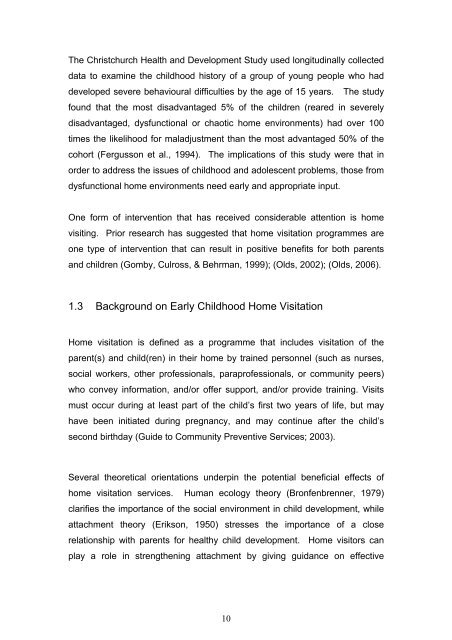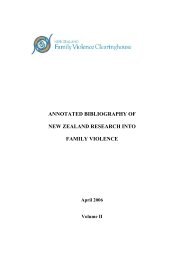Evaluation of Family Help Trust - New Zealand Family Violence ...
Evaluation of Family Help Trust - New Zealand Family Violence ...
Evaluation of Family Help Trust - New Zealand Family Violence ...
You also want an ePaper? Increase the reach of your titles
YUMPU automatically turns print PDFs into web optimized ePapers that Google loves.
The Christchurch Health and Development Study used longitudinally collecteddata to examine the childhood history <strong>of</strong> a group <strong>of</strong> young people who haddeveloped severe behavioural difficulties by the age <strong>of</strong> 15 years. The studyfound that the most disadvantaged 5% <strong>of</strong> the children (reared in severelydisadvantaged, dysfunctional or chaotic home environments) had over 100times the likelihood for maladjustment than the most advantaged 50% <strong>of</strong> thecohort (Fergusson et al., 1994). The implications <strong>of</strong> this study were that inorder to address the issues <strong>of</strong> childhood and adolescent problems, those fromdysfunctional home environments need early and appropriate input.One form <strong>of</strong> intervention that has received considerable attention is homevisiting. Prior research has suggested that home visitation programmes areone type <strong>of</strong> intervention that can result in positive benefits for both parentsand children (Gomby, Culross, & Behrman, 1999); (Olds, 2002); (Olds, 2006).1.3 Background on Early Childhood Home VisitationHome visitation is defined as a programme that includes visitation <strong>of</strong> theparent(s) and child(ren) in their home by trained personnel (such as nurses,social workers, other pr<strong>of</strong>essionals, parapr<strong>of</strong>essionals, or community peers)who convey information, and/or <strong>of</strong>fer support, and/or provide training. Visitsmust occur during at least part <strong>of</strong> the child’s first two years <strong>of</strong> life, but mayhave been initiated during pregnancy, and may continue after the child’ssecond birthday (Guide to Community Preventive Services; 2003).Several theoretical orientations underpin the potential beneficial effects <strong>of</strong>home visitation services. Human ecology theory (Bronfenbrenner, 1979)clarifies the importance <strong>of</strong> the social environment in child development, whileattachment theory (Erikson, 1950) stresses the importance <strong>of</strong> a closerelationship with parents for healthy child development. Home visitors canplay a role in strengthening attachment by giving guidance on effective10












